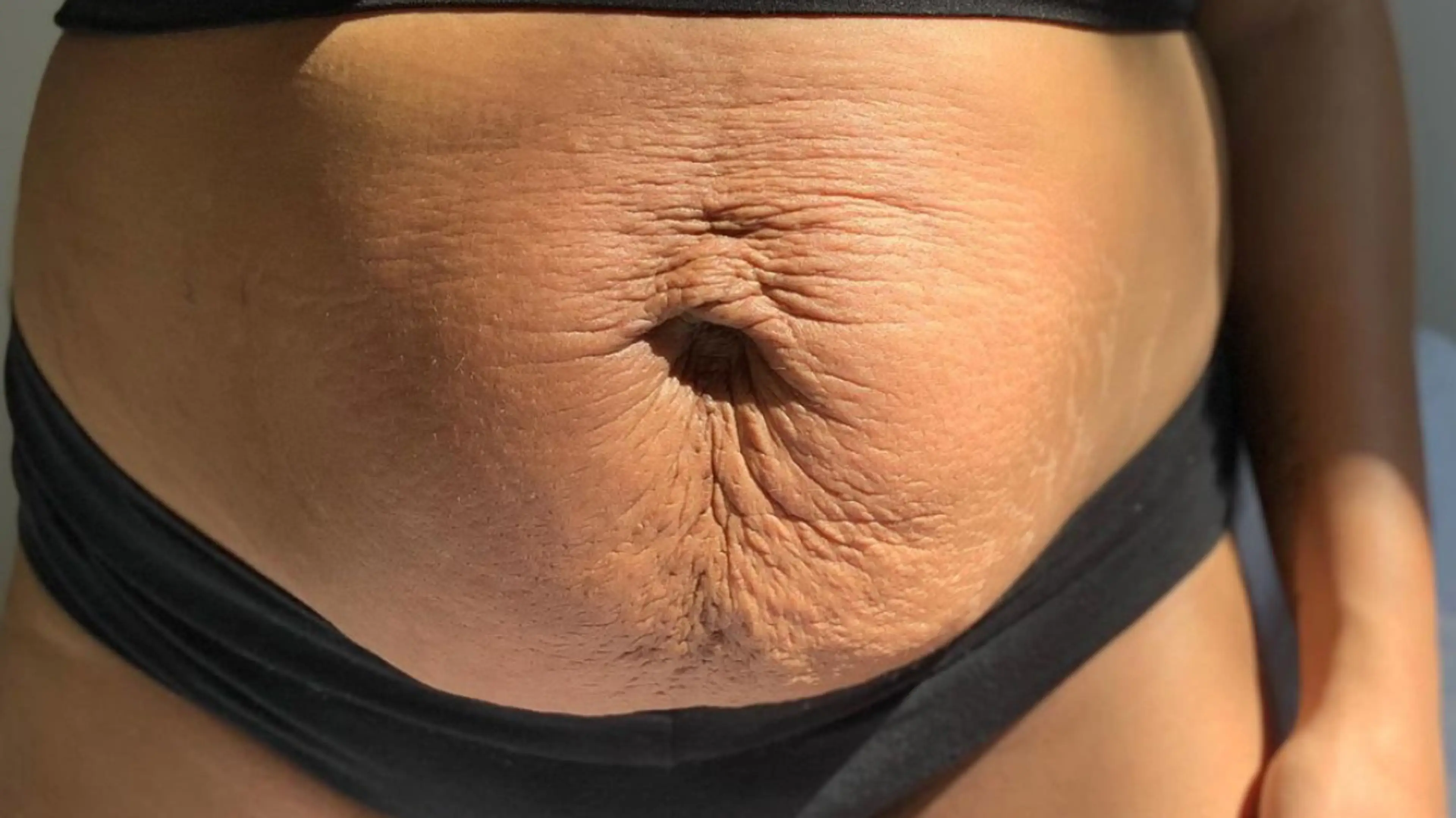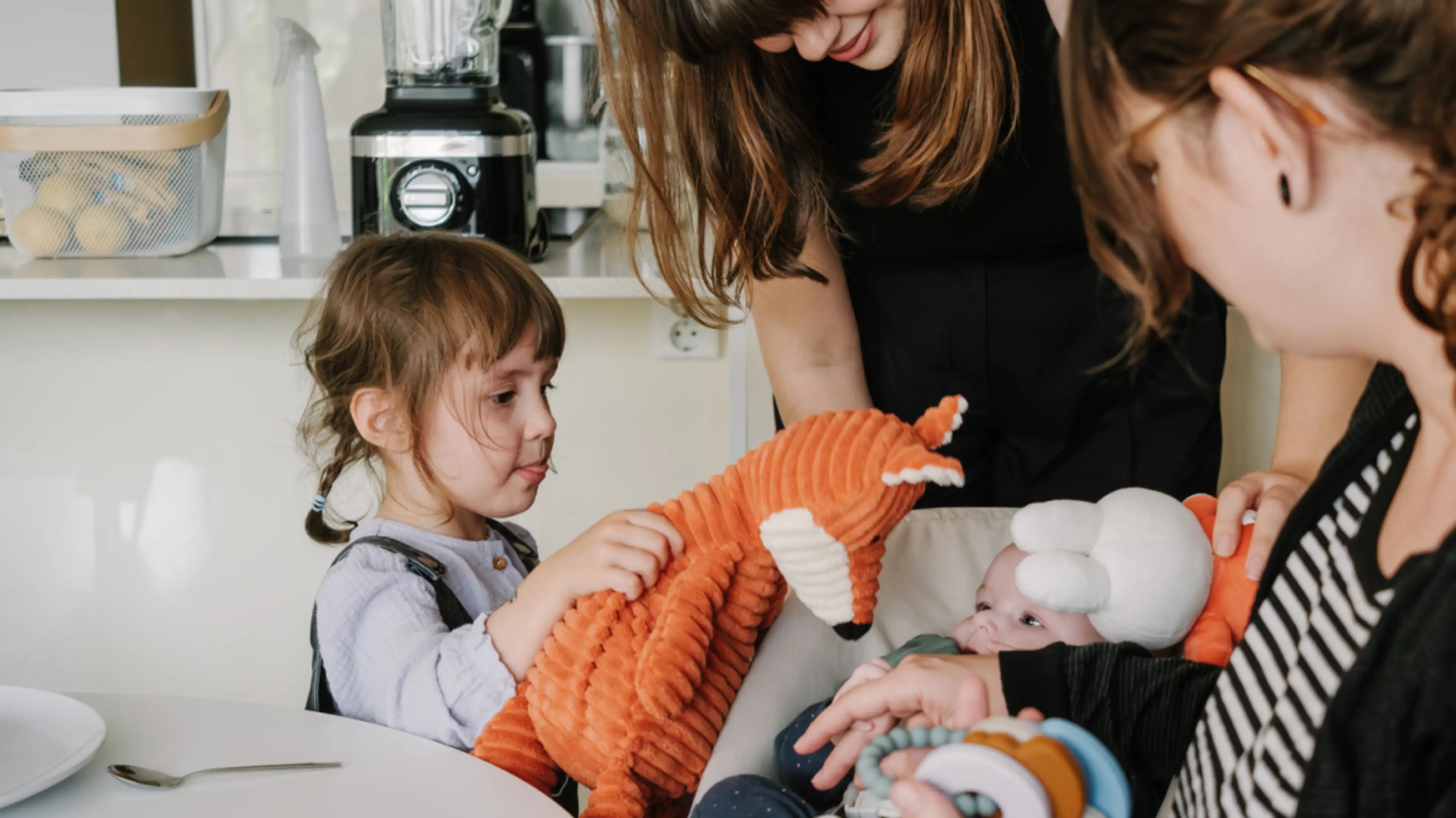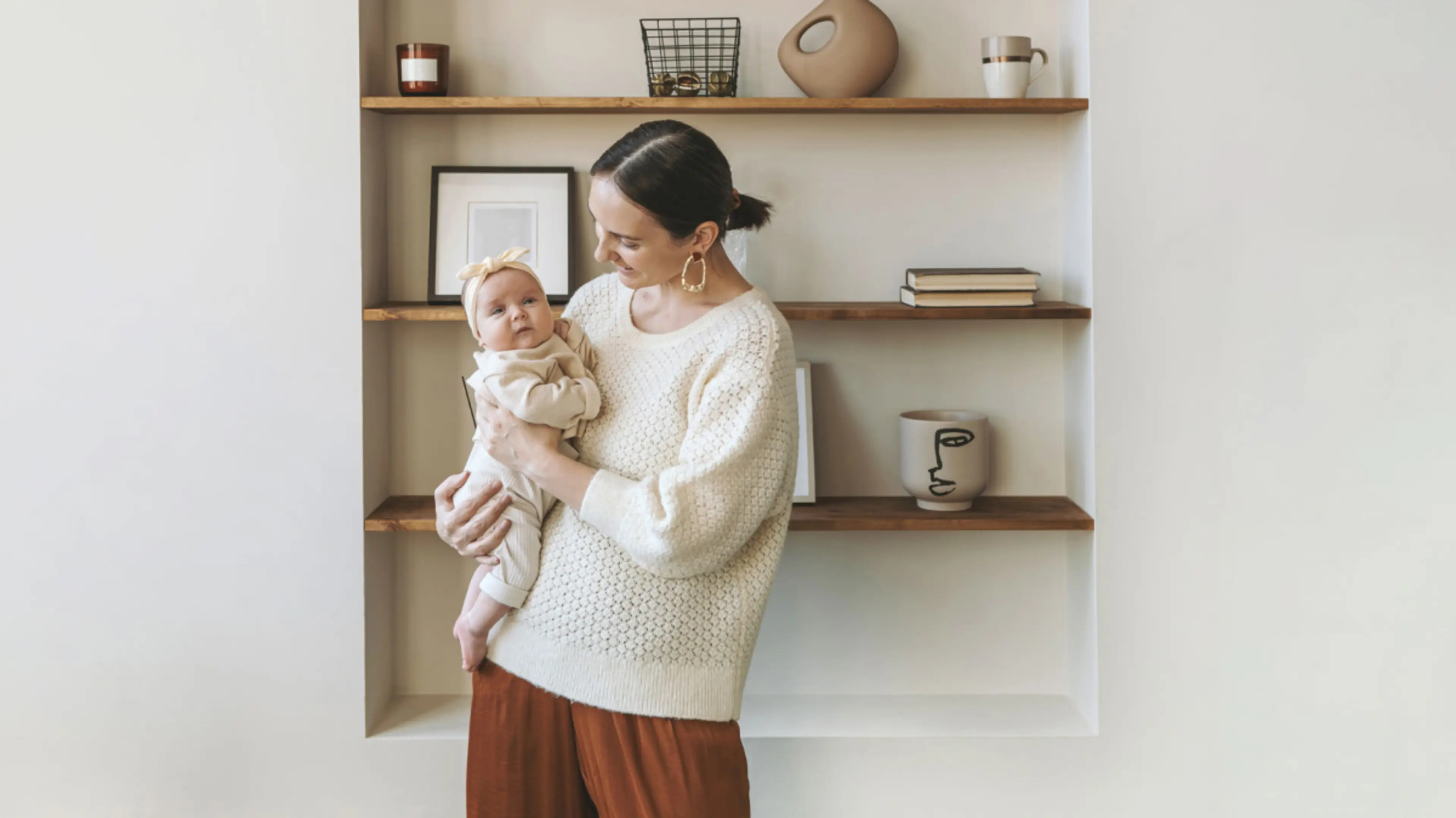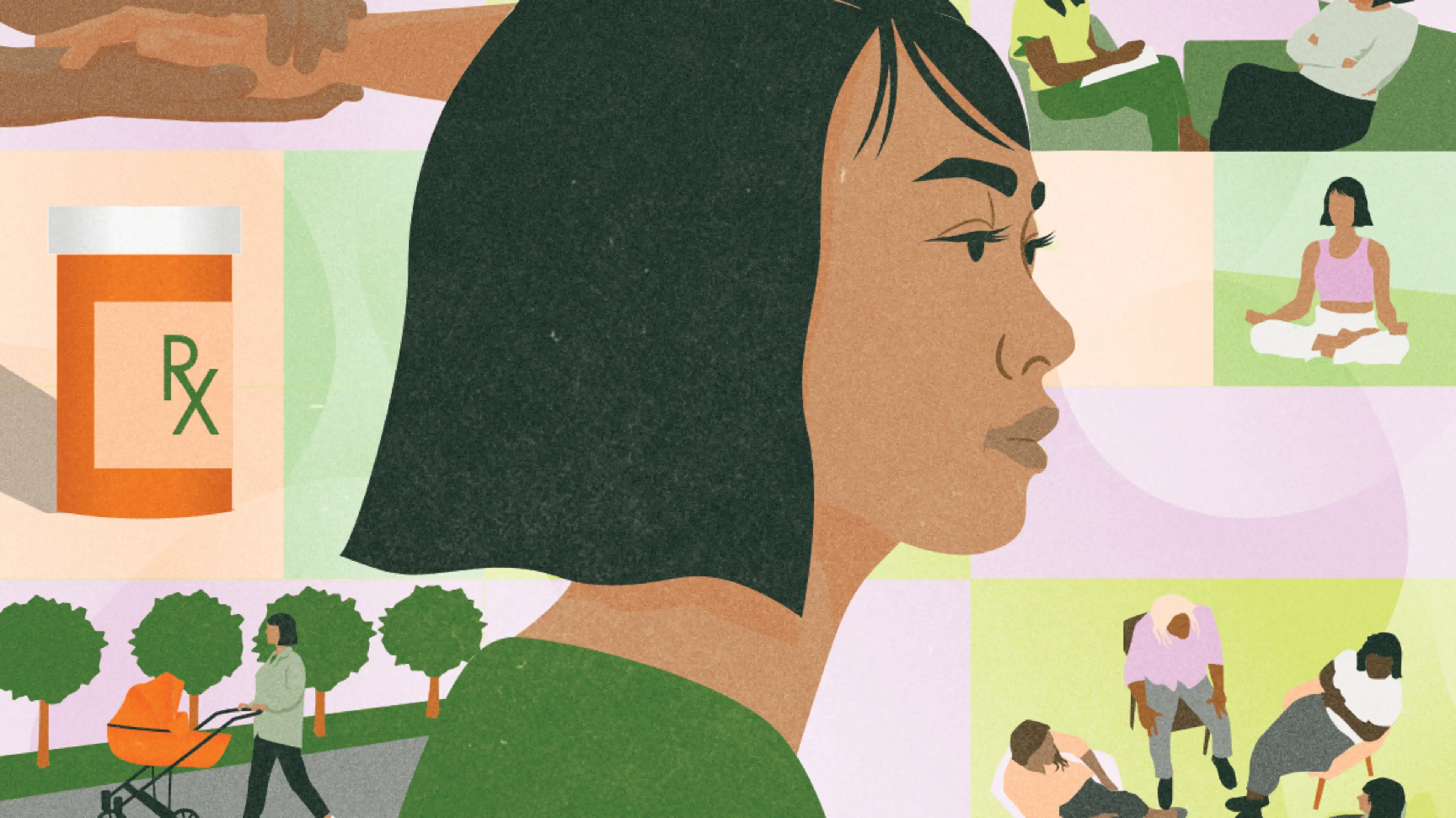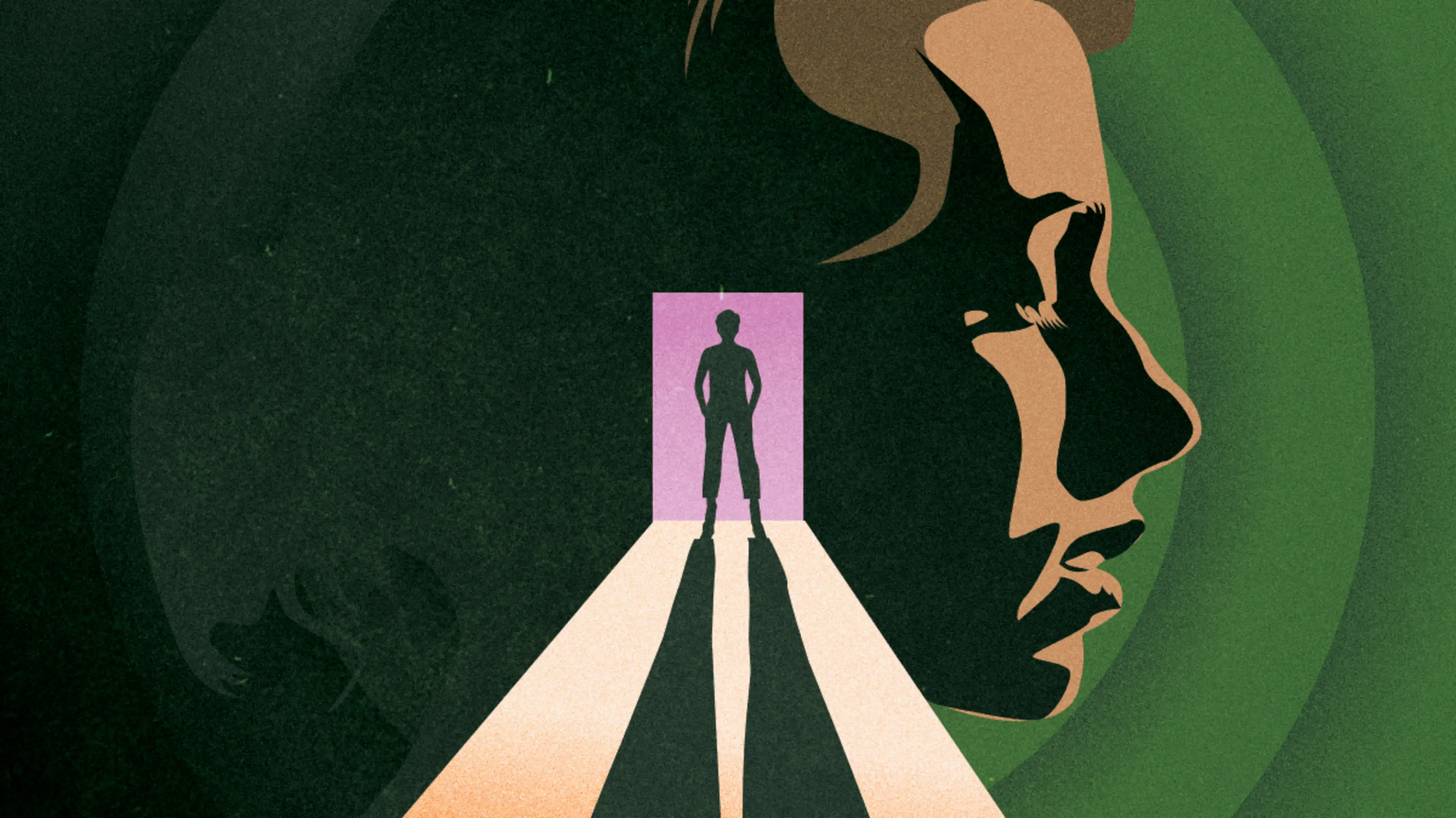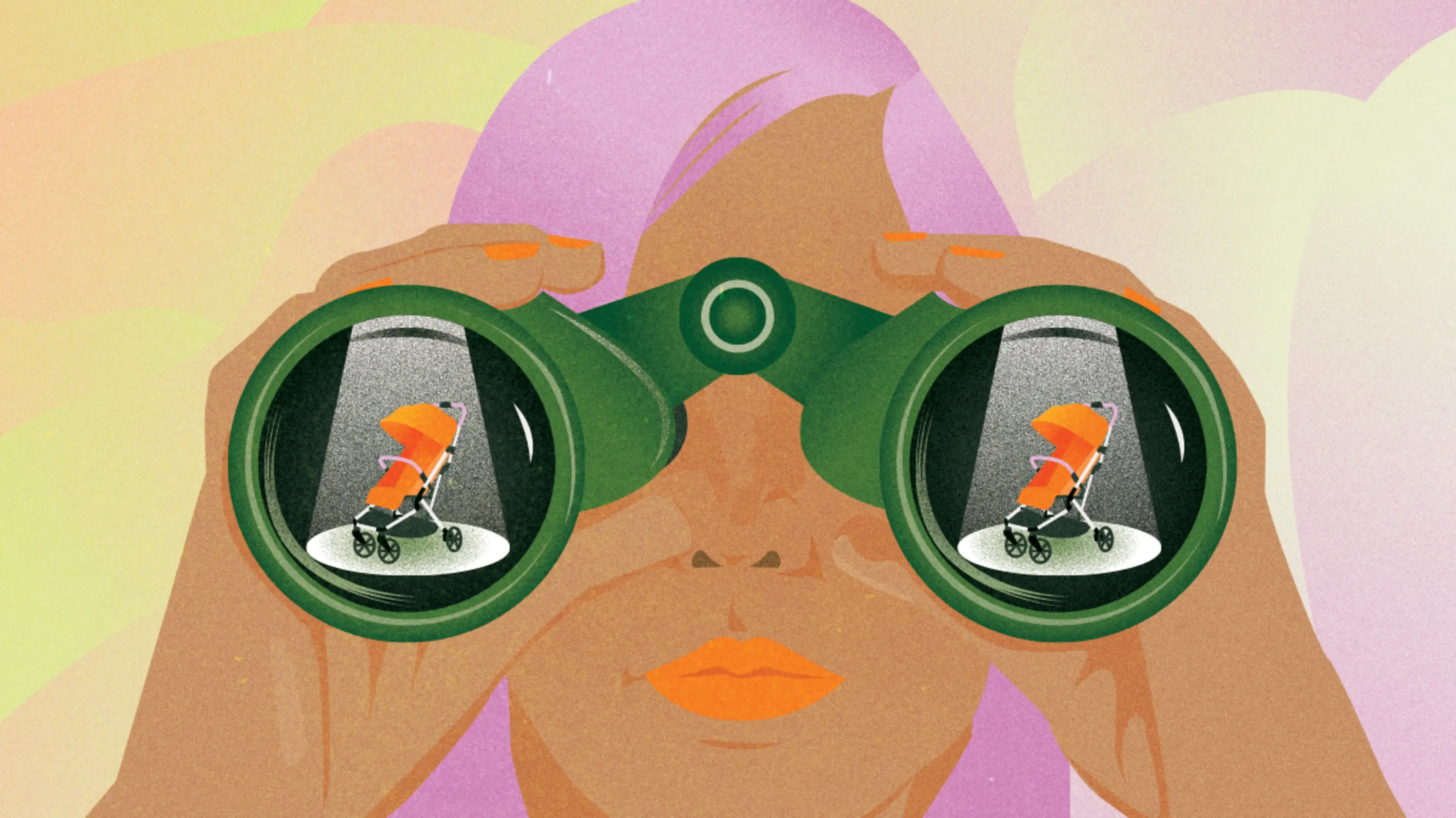It’s one thing to understand why you’re not feeling like yourself after having a baby, and also to learn that there is a general timeline for when your body and brain might come back online after a rough landing into motherhood. But that probably hasn’t stopped you from wondering how you’ll get from point B (the sleep-deprived zombie of your present) back to point A (the carefree, well-rested human of your past). Here’s the truth: you won’t. You are now entering point C. The you-are-never-going-to-be exactly-who you-were-before point. But, that’s not bad—you are on the path to becoming a better, more resilient version of the old you.
Even if you’re dead tired right now, even if you’re still in a fog, with time, certain baby milestones, and a bit of prioritizing of your own self-care, you might start to see glimmers of this well-rounded you sooner rather than later. To get you on the right track, we talked with experts and seasoned moms for tips and insights into how to reconnect with yourself after arguably the most transformative experience of your life. Here’s what they said.
Creating Pockets of Joy In Your New Life Is a Must
Having a baby just about guarantees that the little life pleasures you’ve cultivated over the years kind of go out the window (at least for a while). Early morning runs turn into pre-dawn contact naps in the glider. Your perfectly decorated home now looks like a diaper bag threw up everywhere. Date nights at your favorite sushi place have transformed into passing out side-by-side on the couch. Your life may never go back to exactly the way it was, says Dr. Nicole Derish, a women’s mental health psychiatrist and therapist, but it’s all about reframing.
“You want to start carving out little aspects [of joy] and reincorporating them into your life,” she says. For example, if you were a marathon runner before baby, maybe you can sneak out for a group class during a nap. Or, if your home looked like Architectural Digest pre-baby, maybe carve out one area that is decorated just for you. Date nights might look a little different, but you can still order in, light a candle, and have a romantic meal after the baby has gone to bed. “We have to rebuild those little things that make somebody feel joy, and let go of that all-or-nothing mentality,” says Dr. Derish.
Karissa Whitman, 32, did just that by getting back to her musical roots. “This year I started taking singing lessons again, and it’s just about finding ways to bring the things I love into our current lives,” she says. “I want to find ways to establish a new normal with things that I love, and integrate that with our kids.”
Expecting moms can also get in on this by giving themselves something to look forward to during the sleepless nights ahead. Kassie Hanson, 33, who has three kids and a fourth on the way, already has a binge-worthy show lined up to keep her company during the inevitable wee-hour snuggles with her newborn. “It’s such a small, silly thing, but I’m mentally preparing for the long nights, and having a show I want to watch really helps.”
She’s also booked a few massages for the upcoming year. “It’s the idea that I already know I will get one hour away from everyone to relax, and help my body heal and feel better.”
Read Next: How Long Does it Take to Feel Like Yourself After Having a Baby?
Work Brings a Sense of Normalcy and Routine
Going back to work after having a baby can be extremely stressful for some people, particularly if you’re not ready or you have little (or no) parental leave. For others, having a predictable routine that involves meetings and spreadsheets instead of bottles and diapers is a relief. That was the case when Ann Hand, 39, went back to her high-powered executive marketing job after having her first child. “I remember skipping into my corporate office, because I’d had 16 weeks off, and I was excited for the adult time.”
A few years later that all changed. Hand had switched jobs and just given birth to twins. She was counting down the weeks until she had to return to work thinking, “How am I going to do this?” she says. “I remember I started on a Wednesday, and by Friday I emailed HR saying, ‘I can’t do this.’” Thankfully, her company was extremely supportive and referred her to a professional coach, who helped Hand prioritize her workload and regain her sense of self in the workforce. “I worked with her for 90 days and she helped me see things differently,” says Hand. “Even though our conversations were work-related, it was almost like being in a therapy session.”
Gennifer Rose’s path was a bit different. It took staying at home with her baby to realize she missed the structure of a job. “That first year home with my first baby was very overwhelming,” says Rose, 37. “Being physically out of the house in a workspace helps a lot with just getting back to real life, plus work is actually a stress-reliever for me because it’s a creative outlet.”
Daycare Gives You Time to Recalibrate
Being a parent means you have endless choices, and a million reasons to feel guilty about all of them. Perhaps one of the most fraught decisions is whether or not to send your child to daycare. Will they be well taken care of? Will they be happy? Can I trust someone else to care for my baby the way I would? Those are certainly hard questions to grapple with, but finding people you trust to take care of your kid is a really important step in this whole “reclaiming you” part of the parenthood journey (whether full days, half days, or a few hours here and there).
“Putting my kids in daycare was a game changer,” says Jenn Levin. “That’s when I started to really feel like myself. Like, I have autonomy, I have freedom, I can exercise and work on my business. It really wasn’t until they were consistently out of the house that I felt most like myself again.”
Having help is also a way to finally get the one thing you need most—sleep. “I was extremely sleep-deprived the first year with my daughter, and I did not feel normal until we got her into daycare full-time,” says Rose. “I could finally catch my breath and nap, and just catch up on everything I was behind on.”
Your Baby Sleeping More at Night Is a Huge Milestone
Speaking of sleep, the most talked about milestone in terms of feeling more like yourself after having a baby is getting quality ZZZs. The downside is that when this happens for each child (and mom) is wildly different. All the women I talked to had varying answers—from six months to 3-years old (or older)—but when their child did figure out the whole sleep thing, everyone was happier.
“We did sleep training around six months with my first, and he did end up sleeping through the night pretty well,” says Whitman. “That was big for us.” With her second child, they decided not to sleep train, which amounted to 15 months of multiple sleep interruptions during the night. “Looking back, I wouldn’t change it, but once he started sleeping, it was amazing.”
The effects of sleep deprivation are real. So real that Hanson can recall each time one of her kids finally started sleeping more at night. “I felt like a new person, like a human again, and no longer a zombie.”
If you are locked in a no-sleep-cycle, and the idea of withstanding even one more night of constant interruptions is too much, Ivy Ellis, 38, a therapist and mom to two kids, says it’s extremely important to figure out a way to get some chunks of protected sleep, whether that’s taking shifts with your partner or hiring a nighttime doula—because one person should not be responsible for waking up with the baby every single time. “The lack of sleep can mimic psychosis,” she says. “None of this works if you can’t get sleep.”
Physical Activity Can Help Bring Balance Back
We all know moving your body is good for your physical health, but it’s also a great way to reconnect with yourself. Kristen Cook, 42, a pediatrician and mom to two kids, says moving her body intentionally in a way that felt good—not necessarily for weight loss—was one of the ways she got to a better place after struggling with postpartum anxiety. “When I was able to start exercising again, where I wasn’t physically attached to a child—I was feeling way too touched out—was my way back to the new me,” she says.
Even just getting outside can reset your headspace, says Chandra Sanders, 43, a single mom to three kids. “I have to walk outside every day—I have to find time for that escape to walk, because I find the sunlight helps my brain and charges me up a bit,” she says.
If finding that time is an issue, Sanders has some advice. “It’s all about being intentional with how you spend your time and how you think. You cannot just be the best mom, you’ve got to also be the best woman or person you can be, so that you can continue to move forward.”
Stopping Breastfeeding (or Pumping) Will Give You Freedom
Any parent will tell you that with every first and last that you experience with your baby, there’s a subtle push and pull between joy and heartache. As your baby grows and becomes more independent, yes, you get more of yourself back, but that also means your baby needs you less, which can leave you with lots of feelings.
That’s often the case with breastfeeding. If you generally had a positive experience—extra snuggles and all—coming time to stop can feel like a loss, but it’s also freeing. “Stopping breastfeeding feels like the last step to kind of being totally back to myself, because I’ve had to give my body up to be used to sustain someone else’ life,” says Hanson. “Every time I’ve stopped, I remember crying, like ‘I can’t believe it’s over,’ but also, ‘Ah, it’s over, and now I can leave for the entire afternoon.’”
On the other hand, the intense guilt and shame around struggling to breastfeed or produce enough breast milk—but trying to force it anyway—can take a toll mentally. “I forced myself to pump every three hours around the clock for four months, and it got to the point where I was pumping for 45 minutes and getting a quarter of an ounce,” says Dr. Cook. “One day my husband looked at me—and I was crying—and he said, ‘This is not good for either of you.’”
That was a wake-up call, she says. “I realized that forcing it was not good for my mental health, and there was a lot of guilt and shame about that for so long, but the reality is my son is healthy, he is wonderful, and thank goodness there is formula.”
Finding a Support System Will Get You to the Other Side
It sounds cliche, but creating your postpartum village is one of the best things you can do for yourself after having a baby. “Social support is huge, and it’s important for people who are around a new mom and their baby to not just be helpful, but to be clued in to that person,” says Dr. Panelli, “because a lot of times if that person is suffering or not doing well, they won’t know it, but the people around them will.”
When Willow Li, 40, had her first child, she felt deeply isolated. She was in a funk. Some days she even forgot to take a shower. It wasn’t until months later, when the fog lifted, that she realized she’d even been in a dark place. So the second time around, she made sure to have a support network in place to help her out of it. Li’s mom ended up staying with her for three months—taking care of all her meals and brewing Chinese herbal teas to aid with her recovery. “It helped me so that I wasn’t feeling overwhelmed all the time.”
And then there’s the power of talking to other women about this shared journey of becoming a mom. “I’m so grateful that I get to have this experience talking to moms, my patients,” says Dr. Cook. “For me, during pregnancy, childbirth, and the first year of my son’s life, I felt really alone. I felt like people didn’t talk about the things I was going through because it was supposed to be all sunshine and rainbows—and it wasn’t—and having that connection with other moms was really helpful.”
The moral of the story is that nobody can tell you exactly when you’ll start to feel like yourself again, but you will. So, whether you’ve fallen deeply into this new motherhood season (and can’t find your way to the light), or you’re starting to sense tinges of the old you coming alive, know that you will get back to a version of the person you remember—you’ll just have a few more life lines to show for it.
Read Next: How Long Does it Take to Feel Like Yourself After Having a Baby?


